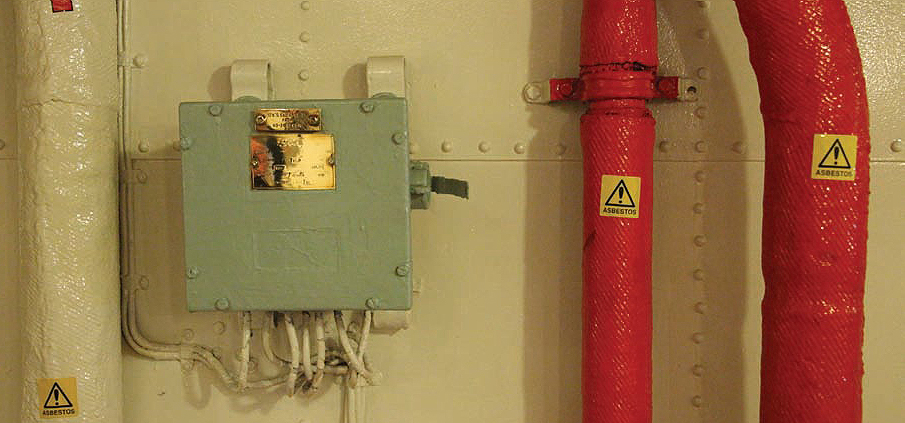- Topics
- Campaigning
- Careers
- Colleges
- Community
- Education and training
- Environment
- Equality
- Federation
- General secretary message
- Government
- Health and safety
- History
- Industrial
- International
- Law
- Members at work
- Nautilus news
- Nautilus partnerships
- Netherlands
- Open days
- Opinion
- Organising
- Podcasts from Nautilus
- Sponsored content
- Switzerland
- Technology
- Ukraine
- United Kingdom
- Welfare

Fabio Seccatore, a partner and head of the asbestos claims team at Humphreys & Co, explains how the deadly material has affected seafarers, and what options you have if you develop an illness as a result of exposure in the workplace. The specialist solicitors have more than 30 years experience in advising and pursuing asbestos-related claims
Many seafarers have, over the course of their working career, been exposed to asbestos.
Being diagnosed with an asbestos-related condition usually comes as a great shock, particularly given that it can take as long as 30-60 years or more for an asbestos-related disease to develop following exposure to asbestos dust.

Asbestos was the insulation of choice, particularly onboard steamships, and was widely used in the construction, maintenance and repair of vessels. Engineers, for example, routinely worked in engine rooms and boiler rooms amongst a complex network of asbestos-lagged pipes where they were required to cut into asbestos lagging or reinstate lagging using asbestos.
The engine rooms and boiler rooms were usually dusty and poorly-ventilated with non-engineering crew frequently exposed to asbestos dust indirectly in this environment.
Many also served on ships where raw asbestos was imported in open-weave hessian sacks or paper sacks, leading to loose asbestos contaminating the ship and other cargo, exposing seafarers to asbestos dust.
It will still be possible to bring a civil claim if your former employer is no longer in business, provided that the company’s insurers can be traced
Asbesto related condtions
Once exposed to asbestos dust, seafarers are at higher risk of developing an asbestos-related condition, including:
Pleural plaques
Areas of thickening that occur in the lining of the lung. They are often discovered incidentally, e.g. when a chest X-ray or a CT scan is performed for another reason.
Pleural plaques do not develop into cancer or any other asbestos-related condition and typically do not cause any symptoms, unless the plaques are very extensive (which is rare).
However, a diagnosis of pleural plaques does suggest that a seafarer has been exposed to asbestos dust and therefore will have an increased risk (albeit very small) of developing other more serious asbestos-related conditions.
As the law currently stands it is not permitted to bring a claim for compensation for pleural plaques in England & Wales, although it is possible in Scotland.
Asbestosis
Pulmonary fibrosis is a build-up of scar tissue which makes the lungs stiff and causes difficulty in breathing. It can be caused by several conditions, but when it is caused by asbestos exposure it is diagnosed as asbestosis.
Asbestosis cannot be reversed, but there are new treatments which can help slow the rate of progression of the disease.
Pleural thickening
Diffuse pleural thickening is where extensive, often smooth, scarring on parts of the pleural membrane lining of the lungs and chest wall thickens to a substantial extent. When this happens, expansion of the lungs is restricted, leading to breathlessness. Unfortunately, the condition is irreversible.
Causes include infection, inflammatory conditions, and the aftermath of heart bypass surgery. Asbestos exposure is a common cause.
Asbestos-related lung cancer
Most people understand that smoking increases the risk of developing lung cancer (around 85% of cases occur in smokers and former smokers), but exposure to asbestos dust increases the risk too. For example, it is not uncommon for a doctor to say that asbestos exposure in smokers increases the risk of developing lung cancer by as much or two or three times compared to the risk from smoking alone.
It is therefore important that people do not smoke if they have been exposed to asbestos dust.
Mesothelioma
Mesothelioma is a type of cancer of the lining of the lung thought by doctors to be almost exclusively caused by exposure to asbestos. In rare cases, mesothelioma can develop in the lining of the abdomen instead of the lung. The symptoms tend to develop gradually over time.
Unlike the other asbestos-related conditions, it is thought by medics that mesothelioma can develop following relatively small amounts of exposure to asbestos dust. It is always fatal.
Compensation
After being diagnosed with an asbestos-related disease there may be compensation available. There are two main ways to seek compensation:
State benefits
If you have been exposed to asbestos at work, you may be entitled to Industrial Injuries Disablement Benefit (IIDB). This is a weekly payment, currently set by the Government at a maximum of £207.60 per week.
When applying for IIDB you do not have to demonstrate any fault on the part of your former employer. Further, it does not matter if your former employer is no longer trading.
You will be required to undergo an assessment with a doctor appointed by the DWP, though in cases of mesothelioma or lung cancer this is normally waived. The doctor will assess your respiratory disability due to your asbestos-related condition on a scale of 1% to 100%.
Your respiratory disability will determine how much IIDB you are awarded per week, up to the £207.60 maximum if you have a respiratory disability of 100%.
Every couple of years you will be reassessed by the DWP and if your respiratory disability has deteriorated, you may be entitled to a higher weekly payment.
If you are awarded IIDB, you may also be entitled to a one-off lump sum payment.
Again, this payment can be made without having to prove fault on behalf of the former employer, and can be made where your employer is no longer trading.
The lump sum you receive is again based on the respiratory disability assessed for IIDB.
If you receive help from your partner or family, you may also be entitled to Attendance Allowance and/or Constant Attendance Allowance, and may apply for a Blue Badge.
Civil claim
In addition to any claim to state benefits, you may be able to pursue a civil claim for damages against the company which exposed you to asbestos dust. A civil claim seeks to compensate you not only for developing an asbestos-related condition, but also for the expenses you incur because of your condition.
It can also ensure that you are able to seek further compensation if your condition worsens (or you develop a new asbestos-related condition).
A civil claim may involve issuing a Court clam against a former employer, but it is very rare for a case to need to be pursued all the way to a trial. The majority of claims settle out of court. A settlement can provide a claimant with access to the chance of receiving life-extending treatments not available on the NHS, such as certain types of immunotherapy. Private treatments such as immunotherapy can be very expensive.
It will still be possible to bring a civil claim if your former employer is no longer in business, provided that the company’s insurers can be traced.
Act fast
Asbestos claims normally involve complicated legal and medical issues and it is advisable to seek legal advice early on.
There is a three-year time limit within which to start an asbestos-related legal claim. The time usually starts from the date of diagnosis but this is not always the case, and it is important that you seek advice as soon as you are diagnosed. Even if it has been longer than three years, the Court can in certain cases still give permission to allow your claim to proceed.
Where somebody dies as a result of an asbestos-related disease, the three years normally re-starts from the date of death.

The Nautilus asbestos register
Nautilus maintains a register where members can record their exposure to asbestos at any stage of their career. This can be used to support claims if evidence of an asbestos-related disease emerges. Nearly 400 seafarers are currently listed.
Nautilus has helped members to receive millions of pounds in compensation after they developed an asbestos-related disease. Since 2008, claimants with pleural plaques have been awarded over £90,000; those with other illnesses such as lung cancer and asbestosis have been awarded over £180,000; and those with mesothelioma have received more than £3,000,000.
To add your name to the register, please email legal@nautilusint.org and request an Exposure to Asbestos Registration Form.
If you do contract an asbestos-related disease, please contact our legal team immediately – time limits apply for making compensation claims.
Tags
